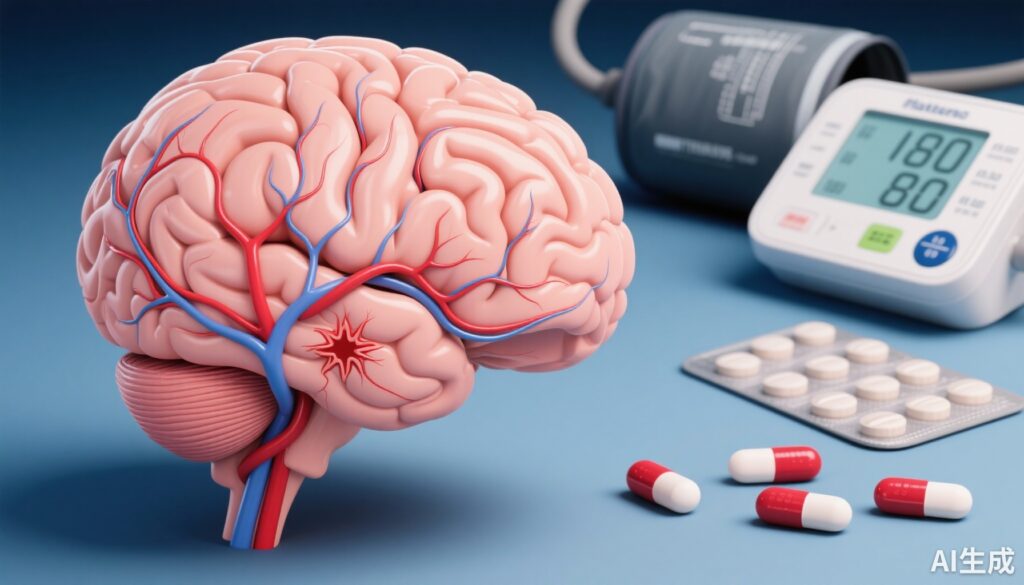Highlight
– Clopidogrel-aspirin dual antiplatelet therapy significantly reduces recurrent stroke risk in patients without a history of hypertension.
– The benefit of clopidogrel-aspirin over aspirin monotherapy is not statistically significant in patients with hypertension.
– Hypertension status may influence platelet reactivity and antiplatelet resistance, affecting treatment efficacy.
– These findings may inform future personalized secondary stroke prevention strategies and clinical trial designs.
Study Background and Disease Burden
Ischemic stroke and transient ischemic attacks (TIAs) represent major contributors to global morbidity and mortality, with a significant risk of recurrence that complicates patient outcomes. Dual antiplatelet therapy (DAPT), particularly combining clopidogrel and aspirin, has become a cornerstone in secondary prevention after minor ischemic events due to its superior efficacy compared to aspirin alone in selected patient populations. However, the impact of comorbid conditions such as hypertension—a prevalent vascular risk factor characterized by elevated arterial pressure—is less understood in modifying antiplatelet treatment efficacy.
Hypertension influences vascular biology, promoting thrombosis, endothelial dysfunction, and increased platelet reactivity, which could contribute to antiplatelet resistance and altered pharmacodynamics of therapies like clopidogrel. Understanding whether hypertension status modifies the benefit derived from DAPT has crucial implications for optimizing stroke prevention and tailoring individualized therapeutic regimens.
Study Design
The Intensive Statin and Antiplatelet Therapy for Acute High-Risk Intracranial or Extracranial Atherosclerosis (INSPIRES) trial was a randomized clinical study evaluating the efficacy and safety of clopidogrel combined with aspirin versus aspirin monotherapy in patients who suffered mild ischemic stroke or had a high-risk TIA.
– Population: 6100 patients with detailed hypertension history; 3915 (64.2%) were men.
– Interventions: Clopidogrel-aspirin dual therapy versus aspirin alone.
– Comparator: Aspirin monotherapy.
– Primary Outcome: Incidence of any new ischemic or hemorrhagic stroke within 90 days post-randomization.
– Hypertension Status Classification: Based exclusively on medical history, patients were divided into those with versus without a hypertension diagnosis.
Key Findings
In the subgroup analyses based on hypertension status, important distinctions emerged:
– Patients Without Hypertension: Clopidogrel-aspirin therapy was associated with a statistically significant 38% risk reduction in new stroke incidence compared to aspirin alone (Hazard Ratio [HR]: 0.62; 95% Confidence Interval [CI]: 0.44-0.86; p = 0.004).
– Patients With Hypertension: No statistically significant difference in stroke recurrence risk was seen between clopidogrel-aspirin and aspirin groups (HR: 0.87; 95% CI: 0.71-1.07; p = 0.18).
– The formal interaction test for differential efficacy by hypertension status approached but did not reach conventional significance (p = 0.085), suggesting a potential but not definitive effect modification.
– Safety profiles, including hemorrhagic stroke risk, did not differ significantly between groups regardless of hypertension status, affirming the treatment’s acceptability within the studied timeframe.
These results suggest that hypertension may attenuate the antiplatelet efficacy of clopidogrel-aspirin combination therapy, possibly due to mechanisms such as enhanced platelet activation or altered drug metabolism associated with hypertensive vascular pathophysiology.
Expert Commentary
The INSPIRES trial provides pivotal data highlighting the heterogeneity in response to dual antiplatelet therapy based on a patient’s hypertensive status. The observed differential efficacy aligns with prior biological insights indicating increased platelet reactivity and antiplatelet resistance among hypertensive patients. This underpins the concept that hypertension is not merely a comorbidity but a potential modifier of pharmacologic responsiveness.
However, the near-significant interaction and overlapping confidence intervals caution against overinterpretation. The subgroup analysis is hypothesis-generating rather than definitive. Further investigations with stratified randomization and mechanistic evaluation of platelet function may clarify these preliminary observations.
From a clinical practice standpoint, while clopidogrel-aspirin therapy remains valuable for secondary prevention broadly, these data hint at the potential need for alternative or adjunctive strategies tailored for hypertensive patients. Moreover, it prompts reconsideration of clinical trial designs to incorporate hypertension status as an enriching variable to maximize therapeutic benefit and resource allocation.
Conclusion
This analysis from the INSPIRES trial suggests that patients without a history of hypertension derive greater benefit from combined clopidogrel-aspirin therapy for secondary prevention following mild ischemic stroke or high-risk TIA, compared with those with hypertension. The evidence supports the concept of hypertension as a modulator of treatment effect, likely mediated by complex vascular and platelet-related mechanisms.
These findings establish a rationale for personalized antiplatelet strategies in ischemic cerebrovascular disease and encourage future clinical trials to stratify recruitment and interventions based on hypertension status. Clinicians should remain vigilant about the varying responsiveness associated with hypertension and optimize comprehensive risk factor management accordingly.
References
1. Liu D, Yan H, Gao Y, Chen W, Johnston SC, Amarenco P, Bath PM, Wang X, Wang M, Wang T, Yang Y, Jing J, Wang C, Wang Y, Pan Y, Wang Y. Effect of history of hypertension on efficacy of clopidogrel-aspirin in ischemic stroke. Int J Stroke. 2025 Oct;20(8):1021-1030. doi: 10.1177/17474930251338618. Epub 2025 Apr 19. PMID: 40251953.
2. Johnston SC, Amarenco P, Albers GW, et al. Ticagrelor and aspirin or aspirin alone in acute ischemic stroke or TIA. N Engl J Med. 2016;375(1):35-43.
3. Wiviott SD, Braunwald E, McCabe CH, et al. Prasugrel versus clopidogrel in patients with acute coronary syndromes. N Engl J Med. 2007;357(20):2001-2015.
4. Patrono C, Morais J, Baigent C, et al. Antiplatelet agents for the treatment and prevention of atherothrombosis. Nat Rev Cardiol. 2017;14(7):471-487.



